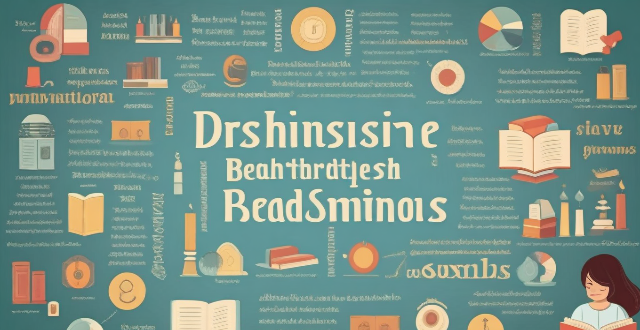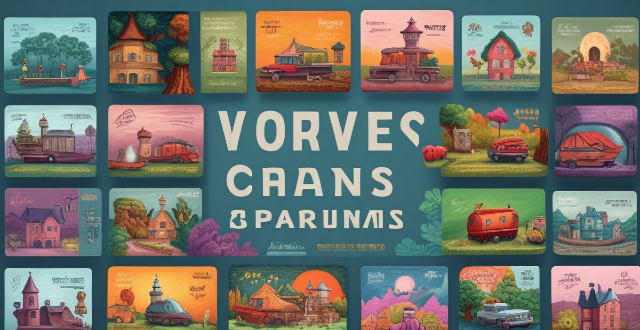Interactive Comprehension

How can technology be used to enhance reading comprehension ?
Technology has revolutionized the way we learn and acquire knowledge. It has also transformed the way we read and comprehend written materials. In this article, we will explore how technology can be used to enhance reading comprehension. Interactive textbooks are digital versions of traditional textbooks that allow students to interact with the content in a more engaging way. They include multimedia elements such as videos, animations, and interactive quizzes that help students understand complex concepts better. Interactive textbooks also provide immediate feedback, allowing students to identify their strengths and weaknesses and adjust their learning accordingly. Audiobooks and e-readers are becoming increasingly popular among readers of all ages. They offer several advantages over traditional paper books, including portability, accessibility, and customization options. Audiobooks are particularly useful for improving listening skills and building vocabulary, while e-readers allow users to highlight important passages, take notes, and look up unfamiliar words easily. Online learning platforms such as Coursera, Khan Academy, and Udemy offer a wide range of courses on various subjects, including reading comprehension. These platforms provide interactive lessons, practice exercises, and assessments that help students develop their reading skills at their own pace. They also offer social learning opportunities through discussion forums and peer reviews. Gamification is the use of game design elements in non-game contexts to enhance user engagement and motivation. In the context of reading comprehension, gamification can involve turning reading assignments into games or challenges that require students to apply what they have learned in a fun and rewarding way. For example, a teacher might create a treasure hunt where students must find hidden clues within a text or solve puzzles based on the content they have read. Personalized learning involves tailoring instruction to meet the individual needs and preferences of each student. Technology can facilitate personalized learning by providing customized recommendations based on students' performance data and learning styles. For example, an adaptive learning system might recommend additional resources or activities for students who struggle with certain concepts or skills.

How do I teach reading comprehension to young children ?
Teaching reading comprehension to young children is essential for their educational development. Here are strategies for making this process engaging and effective: 1. Start with short, simple texts like picture books, nursery rhymes, or short stories that are age-appropriate and interesting. 2. Make reading interactive by asking questions before, during, and after reading to encourage critical thinking. 3. Encourage vocabulary building by highlighting unfamiliar words and discussing their meanings. 4. Incorporate writing activities such as story maps, character sketches, and sequencing to reinforce comprehension skills. 5. Make learning fun by using games, drama, and music related to the text. Adapt your approach based on the child's interests and abilities to ensure maximum engagement and success.

How does speed reading affect comprehension ?
Speed reading is a technique used to read text faster while maintaining or improving comprehension. However, the impact of speed reading on comprehension can vary depending on several factors such as the individual's reading skills, the difficulty level of the material, and the method used for speed reading. In this article, we will explore how speed reading affects comprehension and provide some tips to improve both speed and understanding.

How does reading comprehension relate to critical thinking skills ?
The text discusses the relationship between reading comprehension and critical thinking skills, stating that they are closely intertwined. It explains that good reading comprehension skills enable individuals to understand and interpret written text, which in turn supports critical thinking by enhancing vocabulary, promoting inference and interpretation, encouraging evaluative thinking, and fostering open-mindedness. The text concludes that improving reading comprehension abilities strengthens critical thinking skills, enabling individuals to navigate complex challenges with greater insight and effectiveness.

How can I improve my reading comprehension in a foreign language ?
Improving Reading Comprehension in a Foreign Language Reading comprehension is crucial for learning a foreign language. Here are some tips to enhance your skills: 1. Start with Short Texts: Begin with news articles, blog posts, or children's books to understand simple language and clear structure. 2. Use Dictionaries and Translation Tools: Look up unknown words and phrases, but don’t rely too heavily on them. 3. Practice Active Reading: Engage with the text by asking questions, making connections, and summarizing key points. 4. Read Aloud and Listen to Audiobooks: Improve pronunciation, fluency, and comprehension while enjoying stories. 5. Join a Book Club or Language Exchange Group: Discuss the text, ask questions, and receive feedback from native speakers or other learners. Consistent practice of these strategies will help improve your reading comprehension in a foreign language.

What are the best ways to assess reading comprehension levels ?
Assessing reading comprehension levels is crucial in identifying strengths, weaknesses, and areas for improvement. Various methods include oral reading assessment, retelling or paraphrasing, written response questions, multiple-choice questions, and cloze tests. These techniques evaluate fluency, accuracy, understanding of main idea, details, and structure, factual recall, higher-level thinking skills, quick decision-making, context clue usage, grammar rules, vocabulary knowledge, and overall reading comprehension skills. By using a variety of assessment methods, educators can gain a comprehensive understanding of students' reading abilities and tailor instruction accordingly.

What are some tips for improving reading comprehension skills ?
The text provides tips for improving reading comprehension skills, which include active reading strategies like previewing the text, annotating and taking notes, asking questions, and summarizing. It also emphasizes the importance of building vocabulary through looking up unfamiliar words, using flashcards, and reading widely. Practice is highlighted as a crucial factor in improving comprehension, with suggestions to read regularly, challenge oneself, and join a book club. Understanding the context is another key aspect, achieved by paying attention to details, researching background information, and considering the author's purpose. Consistent practice is emphasized as essential for progress.

How can I improve my comprehension skills in English ?
Improving English comprehension skills is crucial for effective communication. Here are some tips to enhance these abilities: 1. **Read Regularly**: Start with simpler texts and gradually move on to more complex ones, paying attention to new vocabulary, idioms, and sentence structures. 2. **Listen Actively**: Listen to English audio content like podcasts, music, radio shows, and audiobooks to expose yourself to different accents and speaking styles. 3. **Watch English Videos**: Watch movies, TV shows, and educational videos in English, focusing on non-verbal cues and discussing the content with others. 4. **Practice with Language Exchange Partners**: Converse regularly with native speakers, ask questions, and learn from mistakes. 5. **Use Online Resources**: Utilize language learning apps, websites, and forums for interactive exercises, engaging with online communities, and getting personalized feedback.

How can I improve my reading comprehension skills ?
Improving reading comprehension skills requires a consistent effort and the use of various strategies. Here are some key points to help you enhance your ability to understand written texts: 1. Read Regularly - Establish a routine, varying genres and authors. 2. Active Reading - Annotate by highlighting or making notes. - Ask questions before and during reading. 3. Summarize and Paraphrase - Write summaries of sections in your own words. - Create mental images like diagrams or stories. 4. Discuss and Apply - Join book clubs or study groups for discussions. - Apply what you read to real-life situations. 5. Utilize Tools and Resources - Use dictionaries, thesauruses, and research background information. - Access online courses and interactive tools. By integrating these strategies into your daily routine, you can improve your reading comprehension skills over time.

How can I improve communication with my child through interactive activities ?
The text offers guidance on how to enhance communication between parents and children through engaging in interactive activities. It outlines the benefits of such activities, including boosting emotional connection, promoting learning, enhancing social skills, and encouraging open communication. Specific strategies are suggested for choosing age-appropriate activities, involving children in activity selection, setting aside dedicated time, fostering a positive environment, being fully present, encouraging equal participation, reflecting on experiences together, and integrating learning opportunities. Examples of interactive activities include board games, art projects, outdoor adventures, cooking, building blocks or puzzles, reading stories, role-playing games, and science experiments. To maintain engagement, tips such as varying types of activities, adapting to mood, celebrating successes, and learning from mistakes are recommended. The conclusion emphasizes that interactive activities can significantly improve communication by creating a nurturing environment that fosters open dialogue and mutual respect.

Are there any apps or tools that can help me track my progress in understanding different texts ?
The text discusses various apps and tools that can help users track their progress in understanding different texts, including Reading Comprehension Apps like Quizlet and Khan Academy; Productivity Tools for Text Comprehension such as Evernote and Trello; Online Tools for Text Analysis like SparkNotes and CliffsNotes; and Personalized Learning Platforms like Adaptive Learning Systems. These resources provide features such as flashcards, video tutorials, annotations, note-taking, project boards, database views, plot summaries, character analysis, chapter-by-chapter breakdowns, close reading, personalized pathways, real-time feedback, and reading logs to aid comprehension and monitor progress.

How does background knowledge impact reading comprehension ?
Background knowledge significantly impacts reading comprehension by aiding in schema creation, vocabulary recognition, contextual understanding, inferencing, and increasing engagement with the material.

Can regular practice with comprehension quizzes help in improving understanding ?
Regular practice with comprehension quizzes can improve understanding by enhancing reading skills, critical thinking, vocabulary, concentration, and confidence.

What role does vocabulary play in reading comprehension ?
The article discusses the crucial role of vocabulary in reading comprehension. It highlights how a robust vocabulary enhances understanding, improves fluency, promotes critical thinking, and increases empathy. The article also provides tips for improving vocabulary, such as reading widely, using flashcards or apps, looking up unfamiliar words, and practicing using new words. By following these tips, readers can expand their vocabulary and become more effective in comprehending texts.

Can speed reading help me save time when studying for exams ?
Speed reading can save time when studying for exams by increasing efficiency, improving recall, managing time better, and reducing stress. However, it may compromise comprehension, not be suitable for all text types, require skill development time, and lead to overconfidence. To effectively use speed reading, start early, combine techniques, take breaks, test comprehension, and customize your approach.

What are the benefits of having strong reading comprehension abilities ?
Strong reading comprehension abilities can provide numerous benefits such as improved communication skills, enhanced learning capabilities, better problem-solving abilities, and increased employment opportunities.

Is there a link between improved comprehension and critical thinking abilities ?
The link between improved comprehension and critical thinking abilities is explored, with a focus on how these skills are interconnected and work together to enhance cognitive abilities. The article suggests that improving one skill can lead to improvements in the other, creating a virtuous cycle of cognitive development. Techniques for improving both skills are also discussed, including reading widely, engaging in debates, and practicing active listening.

What are the challenges faced by students with poor reading comprehension skills ?
Students with poor reading comprehension skills face numerous challenges in various aspects of their lives, including academic difficulties, lower academic achievement, social and emotional issues, limited career opportunities, and lifelong learning obstacles. These challenges can significantly impact their overall well-being and future prospects, making it crucial for educators, parents, and policymakers to address this issue proactively.

What role do summaries play in improving comprehension of lengthy articles ?
Summaries are crucial for improving comprehension of lengthy articles. They save time, enhance learning, and provide a structured framework for understanding complex information. To use summaries effectively, readers should read the summary first, take notes, and refer back to it after reading the full article. This helps in retaining information and identifying any gaps in knowledge or areas that require further research.

What are some innovative tools for interactive studying ?
Innovative Tools for Interactive Studying Interactive studying has become increasingly popular in recent years as technology continues to advance. There are many innovative tools available that can enhance the learning experience and make it more engaging and effective. Some of the most popular ones include Quizlet, Khan Academy, Duolingo, Kahoot!, and Edpuzzle. These tools offer various modes of interaction, such as flashcards, videos, games, quizzes, and social platforms. By incorporating these tools into your learning routine, you can make studying more engaging, effective, and enjoyable.

How can technology be used to enhance the food festival experience ?
Technology can enhance the food festival experience by offering convenience, customization, real-time updates, and interactive experiences. Online ordering platforms allow attendees to avoid long queues and have food delivered directly to their location. Mobile apps provide features like interactive maps, push notifications, and feedback systems. VR/AR technologies offer immersive experiences such as virtual food tours and interactive cooking classes. Incorporating these technological advancements into event planning can create a more enjoyable and memorable experience for all attendees while increasing engagement with the brand.

How can I make a family dinner more interactive and engaging ?
Making family dinners more interactive and engaging requires planning and creativity. Incorporating themes, open-ended questions, cooking tasks, gratitude jars, and music can create an enjoyable experience that brings the family closer together while promoting communication, teamwork, and positivity.

How can parents encourage their children to develop new skills through interactive activities ?
The article provides strategies for parents to encourage their children's skill development through interactive activities. It emphasizes the importance of hands-on, engaging learning experiences and offers specific tips for creating a supportive environment, involving children in planning, modeling behavior, offering praise, making learning fun, allowing for trial and error, providing practice opportunities, connecting learning to real life, and being patient and persistent. The goal is to help children become well-rounded individuals who are motivated and equipped for future challenges.

Are there any interactive platforms where I can practice programming skills ?
Interactive Platforms for Programming Practice: - Codecademy offers free courses, advanced paid lessons, and project building. - LeetCode provides coding problems, discussion forums, and contests. - HackerRank presents coding challenges across various tech domains. - Exercism features multilingual exercises with mentor support and community interaction. - Repl.it is a cloud-based IDE with multi-language support, collaboration options, and templates.

How has augmented reality transformed fan engagement in sports ?
Augmented Reality (AR) is revolutionizing fan engagement in sports by offering immersive experiences that blend physical and digital elements. AR enhances viewing experiences with interactive overlays and virtual seats, enables in-game interaction through team and player interaction and game day activities, boosts merchandise and sponsorship opportunities with interactive ads and virtual try-ons, aids navigation and wayfinding in stadiums, and encourages social sharing through augmented selfies and virtual reality social spaces. These advancements are transforming the way fans connect with sports and teams, creating more engaging and interactive experiences.

How can educational game developers create engaging and interactive games without sacrificing educational content ?
Educational game developers can create engaging and interactive games without sacrificing educational content by focusing on clear objectives, gamification techniques, feedback mechanisms, collaborative features, and customization options. These key aspects can help developers create experiences that are both fun and educational for players of all ages.

What resources are available for educators looking to incorporate climate change into their lesson plans ?
The text provides a summary of resources for educators to incorporate climate change into lesson plans, including online resources, books and textbooks, videos and films, and interactive tools and simulations. The resources are organized into four categories: online resources such as NASA Climate Kids and National Geographic Education; books and textbooks like "The Sixth Extinction" and "Climate Change: A Multidisciplinary Approach"; videos and films such as "Before the Flood" and "Chasing Ice"; and interactive tools and simulations like C-Learn and Climate Interactive. These resources can be used to create engaging lesson plans that cover various aspects of climate change science, social impact, and solutions.

How do I choose the right online learning resource for my needs ?
When choosing an online learning resource, consider your learningWhen choosing an online learning resource, consider your learning quality, usability, cost consider your learning goals, style, content quality, usability, cost, and interactive features. Look for resources that align with your objectives, cater to your preferred method of learning, provide accurate and up-to-date information, are user-friendly and accessible, offer good value for money, and have interactive features and community support.

What are the future trends in remote education platforms ?
The future of remote education platforms is expected to be shaped by several key trends that will enhance the learning experience, improve accessibility, and make education more personalized and efficient. Here are some of the anticipated trends: 1. Augmented Reality and Virtual Reality: AR and VR technologies can create immersive learning environments where students can interact with educational content in a more engaging way. For subjects like science or engineering, AR/VR can provide practical experiences without the need for physical resources. 2. Artificial Intelligence and Machine Learning: AI can personalize the learning experience by adjusting the curriculum based on individual student progress and preferences. AI can automate grading and provide instant feedback, freeing up teachers' time for more interactive activities. 3. Cloud Computing and Scalability: Cloud-based platforms ensure that educational resources are always available and easily scalable to accommodate large numbers of users. The cloud facilitates collaboration between students and teachers across different geographical locations. 4. Mobile Learning and Microlearning: Mobile apps and responsive designs allow learners to access educational materials anytime, anywhere. Microlearning modules enable quick, focused sessions that cater to short attention spans and busy schedules. 5. Gamification and Interactive Content: Incorporating game elements into learning can increase student motivation and engagement. Interactive simulations can help students understand complex concepts by experiencing them firsthand. 6. Blockchain Technology: Blockchain can provide secure and fraud-proof ways to issue and verify academic certificates. It ensures the integrity of educational records and transactions within the platform. 7. Analytics and Big Data: Advanced analytics can track student performance and identify areas for improvement. Big data can suggest resources or courses tailored to individual student needs. 8. Internet of Things (IoT) Integration: IoT devices can monitor classroom environments and adjust settings to optimize learning conditions. IoT-enabled labs can give students remote access to real-world equipment for experiments. 9. Enhanced Security Measures: With increased digitalization, robust security measures will be crucial to protect sensitive student information. Platforms must ensure a safe environment free from cyber threats and harassment. 10. Social Learning Networks: Online social networks can foster a sense of community among students, encouraging peer-to-peer learning. Connecting students with mentors or industry professionals can provide valuable guidance and networking opportunities.

Can you provide examples of innovative teaching strategies for online education platforms ?
Innovative Teaching Strategies for Online Education Platforms include interactive video lectures, virtual collaborative projects, gamification of learning, personalized learning paths, real-time feedback and assessment, multimedia content and interactive tools, flipped classroom model, social learning networks, augmented reality and virtual reality experiences, and microlearning and bite-sized content. These strategies aim to enhance student engagement, retention, and success in an online learning environment.